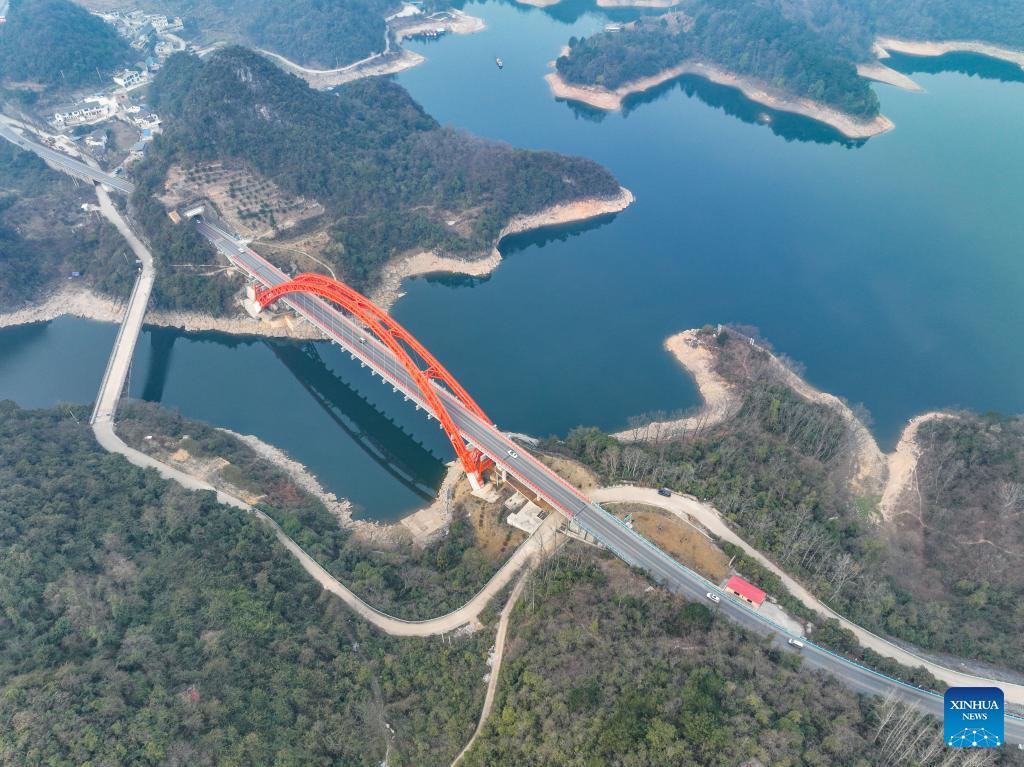
 0 Comment(s)
0 Comment(s) Print
Print E-mail chinadaily.com.cn, July 8, 2024
E-mail chinadaily.com.cn, July 8, 2024

This aerial photo taken on Feb. 1, 2023 shows the Huayudong bridge in southwest China's Guizhou Province. Guizhou has nearly half of the 100 tallest bridges in the world. Due to the large number of bridges, their types and complex technologies used in the construction of the bridges, the province is known as "the museum of world bridges". (Xinhua/Ou Dongqu)
Beyond Mountains and Rivers (Yue Shan He) is a documentary that profoundly explores the construction and development of bridges in Guizhou Province. Comprised of three episodes, each with its own distinct theme — "Dream of Plains,", "Breaking Records," and "High-Speed Plains" — the film transcends mere documentation of Guizhou's infrastructure and economic growth. It serves as a window into the spirit of perseverance, cultural heritage, and harmony between humans and nature, central to China's modernization journey.
China, an ancient civilization with a deep and rich history, is characterized by its unique spiritual characteristics, which are intricately woven into the nation's cultural heritage. In Beyond Mountains and Rivers, the audience witnesses not only modern bridges and impressive infrastructure, but also an indomitable spirit. This spirit is marked by a determination to tackle each challenge presented by nature. Building a bridge may initially appear as stubborn persistence, yet when this persistence accumulates, it evolves into a relentless pursuit—an ambition to transform Guizhou's rugged landscape into smooth passageways, effectively creating its own "plains.". This perseverance is embedded in every piece of reinforced concrete, deriving not from technological advancements or material wealth, but from the Chinese people's profound understanding of their destiny and unwavering belief in conquering obstacles.
The terrain of Guizhou, with its pervasive mountains and rivers, presents a complex and intricate challenge for travel. Historically, this has made mobility difficult for the local populace. To address this, generations have labored tirelessly, breathing new life into the land. Amidst China's rapid development, Guizhou has undergone significant transformation through bridge construction. The province boasts a variety of bridges: from ancient stone arch bridges and light iron chain bridges to majestic suspension bridges. For instance, the Gejing Bridge, one of the most renowned ancient bridges in Guizhou, stands resiliently on a cliff, a testament to the wisdom and craftsmanship of the ancients. Meanwhile, the Deyu Wujiang Grand Bridge, upon completion, is set to become the world's largest deck arch bridge made of steel pipe concrete. The interaction between the ancient and modern bridges forms a dialogue across time and space, illustrating the continuity and evolution of Chinese culture.
When introducing various bridges, the film eloquently captures the aesthetic and engineering marvels of the bridges. Each bridge, with its unique design and construction, stands as a testament to human ingenuity and artistic expression. The documentary presents stunning visuals of these architectural feats, framed against the backdrop of Guizhou's breathtaking landscapes. The interplay of natural beauty and human-made structures creates a visual symphony that resonates with audience, highlighting the harmony between innovation and nature. This aesthetic appeal, combined with the practical functionality of the bridges, underscores the multidimensional value of these projects, reflecting a blend of practicality and artistic excellence.
Moreover, the documentary underscores the vital role of these structures in fostering economic growth and social cohesion. Bridges in Guizhou have catalyzed the development of remote regions, enabling the flow of goods, services, and people, thus invigorating local economies. This infrastructure has not only facilitated commerce and tourism but also provided communities with greater access to education, healthcare, and other essential services. By connecting isolated areas with urban centers, the bridges have effectively narrowed the development gap, illustrating how strategic infrastructure can drive sustainable growth and enhance the quality of life.
The bridges not only facilitate transportation but also symbolize cultural significance. They link cities with villages, mountains with plains, fostering closer interaction and communication among people from different regions. This connectivity highlights the cultural diversity of Guizhou, an integral part of Chinese culture. The richness and diversity of Chinese culture stem from its extensive history and vast geographical landscape. In Guizhou, nestled among mountains and rivers, numerous ethnic groups reside, each with its unique cultural heritage and lifestyle, contributing distinct colors and charm to Chinese society.
Simultaneously, the documentary reflects the concept of harmonious coexistence between humans and nature. In traditional Chinese culture, humans and nature are perceived as a unified whole, complementing and depending on each other. Through aerial views, the audience can appreciate the rapid advancement of modern technology alongside the natural beauty crafted by both technology and nature. Guizhou's mountains and rivers serve as habitats and sources of human activity and cultural creation. The construction of bridges transcends the physical act of spanning geographical spaces; it symbolizes the reflection and demonstration of the relationship between humans and nature. Beyond Mountains and Rivers showcases this harmonious coexistence, revealing the perfect blend of human ingenuity and natural scenery.
To sum up, Beyond Mountains and Rivers does more than chronicle the journey of bridge construction in Guizhou. It captures the grandeur of the province, known as the "Bridge Museum,", and exemplifies the cultural confidence of a nation. This film vividly portrays the Chinese spirit, cultural heritage, and the exploration of the relationship between humans and nature. It conveys that development is not solely about economic growth and technological progress but also about promoting perseverance, preserving cultural excellence, and respecting nature.